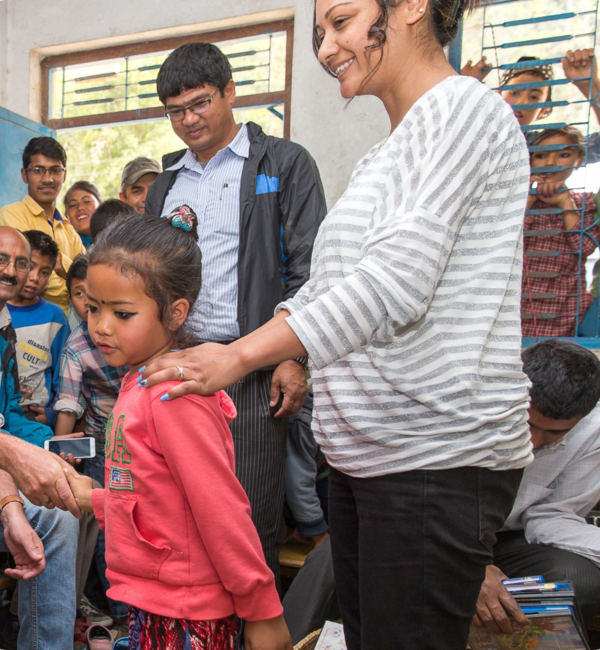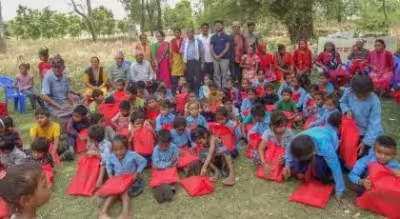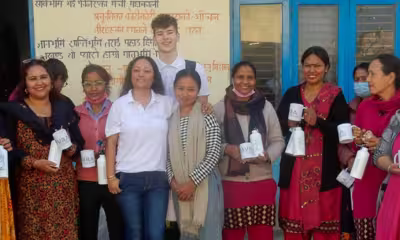
Shanti: Javra has been involved in various community support initiatives since its inception. The organisation has always believed in giving back to the community and its support has been based on the needs of different sectors.
Following the devastating earthquake in Nepal in 2015, the organisation's involvement in community support began to focus more on helping underprivileged children. During its earthquake relief programmes for victims in rural Nepal, Javra recognised the significant challenges faced by underprivileged children, particularly girls, in accessing education. As a result, Javra made a profound decision to focus on supporting disadvantaged children, while also providing other community support as needed. The earthquake highlighted the difficulties faced by children in rural Nepal, particularly in accessing education due to a lack of basic necessities.
We shifted our focus to helping underprivileged children in rural Nepal after realising the challenges they face, particularly in the aftermath of the earthquake.
Shanti: In many rural areas of Nepal, education is not sufficiently emphasised or valued by families and communities. In addition to this cultural perception, there are significant infrastructural challenges that prevent children from attending school. Some of these challenges include:
- Inadequate or poorly built classrooms
- Lack of basic sanitation facilities, such as toilets
- Limited access to safe drinking water
- Insufficient school supplies like stationery
- Inadequate clothing, especially in winter
- A shortage of trained and qualified teachers
- Lack of menstrual hygiene products for girls
Shanti: We take a comprehensive approach. Our process begins with identifying the most urgent needs through surveys and local recommendations. Based on these findings, we develop targeted projects. Primarily, we work with government schools in rural areas and focus on providing basic necessities that help children attend school regularly. This includes:
- Sanitary pads for girls
- School uniforms, shoes, bags, and winter clothing
- Daily meals at school
We also invest in improving school infrastructure, such as building proper classrooms and installing toilets. Additionally, we sponsor teachers and ensure schools have the supplies they need. Beyond material support, we run awareness programmes that emphasise the importance of education and offer skill development opportunities within schools.
Our approach tackles both immediate challenges—like lack of clothing and sanitary facilities—and long-term goals by fostering a culture that values education.
Shanti: In rural areas, girls are denied the same opportunities as boys to explore and experience their lives. Men are the primary decision-makers, while women are often confined to traditional roles, primarily limited to household chores. Lack of education further limits girls' opportunities, making it harder for them to pursue their dreams and aspirations.
This situation reflects entrenched social norms in rural communities, where girls face significant barriers not only in accessing education, but also in having the freedom to explore their potential. Education is a key factor in breaking this cycle and empowering girls to achieve more in their lives.
Shanti: One story that stands out is that of a young girl from a rural village, whom Javra has supported since she was in the 8th grade. Thanks to our support, she is now pursuing her graduation at a renowned college in Nepal. She moved from her village to the city and is successfully advancing her education, a journey that would not have been possible without Javra’s intervention.
Another achievement is our ongoing support of 1,000 children across five schools in different parts of Nepal. By providing essentials like uniforms, sanitary materials, clean water, and improving school facilities, we’ve significantly improved school attendance. Notably, more girls are attending school now that they have access to proper clothing, separate toilets, and sanitary materials. Also, since Javra started supporting these schools, the school management and teachers are more motivated because their challenges are recognised and addressed by Javra. This results in a more positive learning environment for the students.
Finally, beyond education, Javra is involved in various social activities such as organising plantation drives and public cleanliness campaigns. These initiatives help foster a sense of community responsibility and environmental awareness.
Shanti: We are committed to continuing our current projects for as long as the schools need us. We also plan to extend our support to more schools that are severely underserved. Recently, we established a CSR committee in Nepal to ensure that our initiatives are well-planned and resourced. Our focus will remain on education, but we are also exploring other areas of community support.
We’ll continue organising annual CSR activities, aligned with our mission of "Giving Back to the Community," to make a sustained impact.
Shanti: Sharing is Caring, and we live in a society where we all have a role to play. By enriching society, we contribute to a better future for humanity. At Javra, we believe that supporting the education of children—our future leaders—is one of the most impactful ways we can give back.
CSR helps businesses strengthen the social fabric, and in turn, fosters a sense of collective responsibility. It’s about making a meaningful difference and promoting positive change.
Shanti: There are many types of social issues and problems in the world we live in today, and it is not possible for a commercial organisation to tackle them all. A more effective approach may be to focus on a single major area where a substantial contribution can be made, resulting in a long-term positive impact.
Depending on the resources available, contributions can take many forms: funding, sharing knowledge, organising a 'care day' to support initiatives, or other volunteer activities. By focusing on where we can make the biggest difference, we can ensure that our efforts are effective and sustainable.
We extend our heartfelt thanks to Shanti Pant for sharing her insights and passion for CSR. At Javra Software, we remain dedicated to empowering communities through education and other meaningful initiatives. We invite you to join us on this journey and help make a difference—one child, one school, one community at a time.
Stay connected with us and learn more about these initiatives as we continue building a brighter future together.



